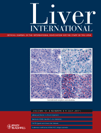S-adenosyl-l-methionine inhibits collagen secretion in hepatic stellate cells via increased ubiquitination
Abstract
Background: Liver fibrosis is the excessive accumulation of extracellular matrix (ECM) components that disrupt normal liver microcirculation and lead to organ injury. Hepatic stellate cells (HSCs), following transdifferentiation, are the central mediators of hepatic fibrosis through increased secretion of ECM components, including type I collagen.
Aims: The mechanism(s) by which the antioxidant S-adenosyl-l-methionine (SAMe) acts to modulate type I collagen secretion in activated HSCs was examined.
Methods: Hepatic stellate cells were culture-activated for 13–15 days and treated with SAMe. Type I collagen, proteasomal activity and resident endoplasmic reticulum (ER) protein [78-kDa glucose-regulated protein (Grp78) and protein disulphide isomerase (PDI)] expression were measured. Nuclear factor-κB (NF-κB) activity, and its role in SAMe-mediated collagen inhibition, was determined. Type I collagen polyubiquitination was examined.
Results: S-adenosyl-l-methionine significantly inhibited type I collagen secretion without significant changes in type I collagen mRNA expression. SAMe also increased NF-κB activity, and blocking NF-κB activity using a dominant-negative IκBα abolished the SAMe-mediated type I collagen secretion. Examination of the post-transcriptional fate of procollagen demonstrated that SAMe treatment led to intracellular type I collagen polyubiquitination accompanied by diminution of proteasomal activity. Expression of Grp78 and PDI (resident ER proteins) were significantly decreased by SAMe treatment.
Conclusions: S-adenosyl-l-methionine inhibits collagen processing leading to increased ubiquitination and decreased secretion. These findings represent a novel mechanism for modulating type I collagen expression in activated HSCs.




